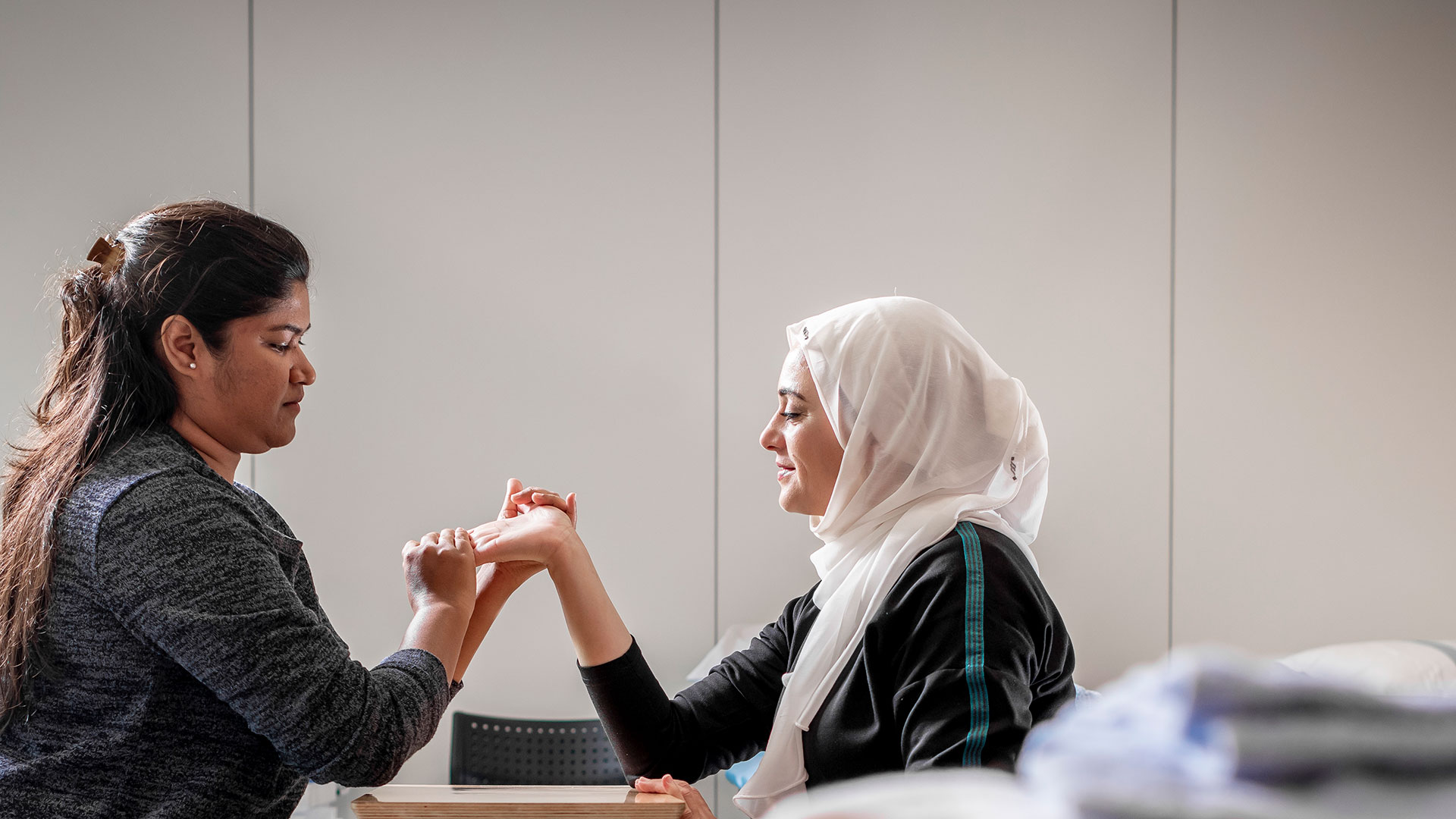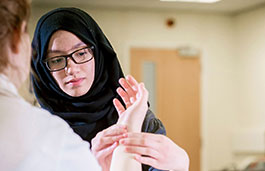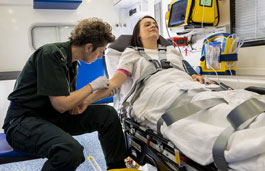Search
Musculoskeletal Physiotherapy MSc
Study level: Postgraduate
The Musculoskeletal Physiotherapy MSc is aimed at fully qualified, experienced practitioners who want to make a difference to clinical practice and work in senior clinical roles.
Course features
Year of entry
2024-25
Location
Coventry University (Coventry)
Study mode
Full-time
Part-time
Duration
1 year full-time
2 years part-time
Course code
HLST246 (MACP pathway)HLST247
Start date
September 2024
Course overview
This is a clinically focused course designed to equip you with high-level critical, evaluative and clinical skills across the four pillars of advanced practice (research, education, clinical and leadership).
- The course provides you with a coherent programme of study relevant to current advanced musculoskeletal (MSK) physiotherapy practice.
- It also offers a wide range of educationally transformative learning opportunities that will enable you to explore and extend the skills, knowledge and professional expertise required to be able to lead and influence musculoskeletal service delivery in a wide range of practice settings.
- The MACP pathway offers 150 hours mentored clinical practice placement2, 5 (sourced by the university) where skills and knowledge gained on the course are applied to the practice setting.
- You will learn from our experienced teaching team in the Alison Gingell Building which provides a stimulating learning environment for healthcare professionals.
Joint Top Modern University for Career Prospects
Guardian University Guide 2021 and 20225 QS Stars for Teaching and Facilities
QS Stars University RatingsTop 5 UK Student City in England (Coventry)
QS Best Student Cities Index 2024Why you should study this course
Physiotherapists in advanced practitioner roles are expected to be clinical experts in their fields who provide leadership and strategic vision and contribute to teaching and research. Postgraduate education is essential for physiotherapists taking up these roles to allow them to work at the optimum level of their skill set and to support development of the key qualities required for advanced practice. These include the ability to draw on the evolving evidence base, the capacity for leadership, the ability to be innovative and to initiate change, to facilitate learning in others and the capacity for effective collaboration (CSP 2018; HEE 2018).
The clinically focused programme has been re-designed to support the development of specialist physiotherapists within the changing social and healthcare landscape. It is aimed at fully qualified, experienced and highly motivated practitioners who want to make a difference to clinical practice and work in senior clinical roles. It aims to equip practitioners with advanced level knowledge and skills capable of promoting MSK health, providing safe, effective, high-quality care in the diagnosis and management of individuals with MSK disorders.
Alongside this, the course aims to develop physiotherapists who will excel as clinical leaders with the capacity to influence local service delivery; foster evidence-informed practice; lead clinical teams and contribute to the education of the local healthcare workforce. The overall course aim is to produce graduates who will operate at the highest level of practice ready to move into senior clinical roles such as first contact practitioners, advanced physiotherapy practitioners, clinical specialists and consultants.
Two pathways are offered on the MSc course: the MACP pathway (HLST246) and non-MACP pathway (HLST247). You are required to choose which pathway you will undertake at the outset of the course.
The MACP pathway has been established for students who wish to complete a period of mentored clinical practice with a Musculoskeletal Association of Physiotherapists (MACP) qualified mentor. The placement can be sourced for you by the university2, 5 and there are no additional fees for the period of mentored clinical practice (additional costs may apply such as travel and accommodation). This MACP pathway leads to an additional qualification of membership to the MACP (additional fees apply). The placement module facilitates the consolidation and application of university-based learning to the clinical setting and allows for fully authentic development of advanced-level clinical practice in MSK Physiotherapy in the workplace.
Three awards are offered on the programme: MSc Musculoskeletal Physiotherapy (180 credits); PgDip Musculoskeletal Physiotherapy (120 credits); PgCert Musculoskeletal Physiotherapy (60 credits), and you can apply for any one of these awards. To achieve the necessary number of credits for each award, you must achieve a 40% pass mark for all modules contributing to the award.
To qualify for the PGCert award you must complete the following modules:
- Musculoskeletal Management for Advanced Practice
- Specialist Musculoskeletal Physiotherapy Practice
- Advanced Physiotherapy Practice
To qualify for the PGDip award you must complete the above modules as well as:
- A Clinical Approach to Pain for Health Professionals
- Developing Expertise for Professional Practice
- Leading Diverse Workforces (CMI module)
- Research Methods, Methodology and Design
To qualify for the MSc award you must complete the above modules as well as:
- Applied Research for Advanced MSK Practice
- Research Methods, Methodology and Design
And one of the following:
- Clinical Practice in Musculoskeletal Physiotherapy (MACP pathway only)
OR
- Evidence Based Practice (Non-MACP pathway only)
Accreditation and professional recognition
This course is accredited1 by the following bodies:

Chartered Management Institute (CMI)
As part of this course, you will undertake a professional development module which is currently accredited by the Chartered Management Institute (CMI) for the 2023-24 intake. Upon successful completion of the module, you will gain the CMI Level 7 Certificate in Strategic Management and Leadership Practice at no additional cost. Further details can be found under the modules tab and on the Professional Development module homepage.
Musculoskeletal Association of Chartered Physiotherapists (MACP)
This course (MACP pathway only) is accredited by the Musculoskeletal Association of Chartered Physiotherapists (MACP) for the 2023/2024 intake. We have long-standing, strong links with the MACP, the professional body that sets and regulates postgraduate educational and clinical standards for MSK physiotherapy in the UK. MACP accreditation is an additional statement of course quality. It also maps directly to Health Education England's (HEE) Advanced Clinical Practice (ACP) Framework (2018) and their Musculoskeletal Core Capabilities Framework for First Contact Practitioners (2019) both of which reflect the current changes in healthcare delivery.
You will be eligible to become a member of Musculoskeletal Association of (MACP) on completion of the Musculoskeletal Physiotherapy MSc (MACP pathway only) (application and fees may apply).
What you'll study
We regularly review our course content, to make it relevant and current for the benefit of our students. For these reasons, course modules may be updated.
How you'll learn
You will be taught using a mixture of strategies including practical seminars, debates, group work, presentations, lectures, workshops, peer learning, pre-session activities, involvement of service users and problem-based learning using case reports, case scenarios and case studies. These activities are supported through the use of learning-enhanced technology.
The course has been designed to be progressive. Module content in semester 1 of the full-time course is used to inform teaching and learning in semester 2 and 3 to build on and progressively develop the knowledge and skills required for advanced MSK clinical practice. This approach facilitates a meaningful, clinically relevant student experience with the aim of modelling high standards of patient care in a variety of ways.
This course can be offered on a part-time basis. Whilst we would like to give you all the information about our part-time offering here, it is tailored for each course each year depending on the number of part-time applicants. Therefore, the part-time teaching arrangements vary. Request further information about part-time-study.
Teaching contact hours
Full-time students are usually in university two days a week with 3-8 hours of teaching scheduled per day.
Part-time students are usually in university for one day per week with 8 hours teaching per week in year one and 3-6 hours teaching per week in year two.
In both cases, teaching is comprised of a combination of seminar sessions, workshops, practical sessions and lectures. The contact hours may be made up of a combination of face-to-face teaching, individual and group tutorials, and online classes and tutorials.
Additionally, you will be expected to undertake significant self-directed study of approximately 20 hours each week for full-time students and 10 hours per week for part-time students, depending on the demands of individual modules.
As an innovative and enterprising institution, the university may seek to utilise emerging technologies within the student experience. For all courses (whether on-campus, blended, or distance learning), the university may deliver certain contact hours and assessments via online technologies and methods.
Since COVID-19, we have delivered our courses in a variety of forms, in line with public authority guidance, decisions, or orders and we will continue to adapt our delivery as appropriate. Whether on campus or online, our key priority is staff and student safety.
Assessment
You will be assessed through a varied schedule of assessments across the course to ensure you are thinking critically, are clinically competent and have developed the key knowledge, attitude, values and skills required for advanced clinical practice and postgraduate study.
The course assessments have been designed collectively to complement each other and to be learning tools in themselves. Examples of different assessment methods used include:
- presentations
- practical vivas
- clinical vivas
- case reports
- critical literature reviews
- essays
- reflective assignments
- research proposals
- articles for publication
- poster presentations
- educational vlogs
- case studies.
These different assessment approaches are fully relevant to clinical practice and cover written, presentation and visual modes to acknowledge and support different student approaches to learning and different skills required in the workplace.
The Coventry University Group assessment strategy ensures that our courses are fairly assessed and allows us to monitor student progression towards achieving the intended learning outcomes.
Entry requirements
Typical offer for 2024/25 entry.
Fees and funding
2024/25 tuition fees.
| Student | Full-time | Part-time |
|---|---|---|
| UK, Ireland*, Channel Islands or Isle of Man | £11,200 | Request fee information |
| EU | £11,200 per year with EU Support Bursary** £18,600 per year without EU Support Bursary** |
Not available |
| International | £18,600 | Not available |
For advice and guidance on tuition fees3 and student loans visit our Postgraduate Finance page.
We offer a range of International scholarships to students all over the world. For more information, visit our International Scholarships page.
Tuition fees cover the cost of your teaching, assessments, facilities and support services. There may be additional costs not covered by this fee such as accommodation and living costs, recommended reading books, stationery, printing and re-assessments should you need them.
The following are additional costs not included in the tuition fees:
- Any optional overseas field trips or visits: £400+ per trip.
- Any costs associated with securing, attending or completing a placement (whether in the UK or abroad).
- HLST246 (MACP pathway) also carries a placement fee of £750 for which a separate invoice is raised.
*Irish student fees
The rights of Irish residents to study in the UK are preserved under the Common Travel Area arrangement. If you are an Irish student and meet the residency criteria, you can study in England, pay the same level of tuition fees as English students and utilise the Tuition Fee Loan.
**EU Support Bursary
Following the UK's exit from the European Union, we are offering financial support to all eligible EU students who wish to study an undergraduate or a postgraduate degree with us full-time. This bursary will be used to offset the cost of your tuition fees to bring them in line with that of UK students. Students studying a degree with a foundation year with us are not eligible for the bursary.
Facilities
Our aim is to offer you sector-leading facilities4.
- You will have access to clinical skills labs, with the opportunity to use state-of-the-art equipment including gait assessment lab and assessment tools.
Careers and opportunities
Successful completion of this course will enable you to demonstrate your competence as a practitioner who is a specialist in the MSK field of physiotherapy ready to move into a wide range of senior clinical roles such as first contact practitioners, advanced physiotherapy practitioners, clinical specialists, consultants, lecturers, researchers, private practitioners and healthcare managers with the ability to deliver and influence current and future clinical practice.
The course also offers the opportunity to gain additional qualifications relevant to advanced clinical practice
- Students who successfully complete the MACP pathway will gain membership of the MACP (additional fees and application may apply).
- Upon successful completion of the CMI module, you will gain the CMI Level 7 Certificate in Strategic Management and Leadership Practice at no additional cost. Further details can be found under the module section and on the Professional Development module homepage.
This course supports the upskilling and development for FCP, ACP and specialist MSK practitioner roles. It fully explores the four pillars of advanced clinical practice and maps to the Advanced Clinical Practice Framework (2018 Health Education England); the First Contact Practitioner Framework for Musculoskeletal Physiotherapists (2019, Health Education England) and the International Federation of Manipulative Physical Therapists Education Standards (IFOMPT, 2016).
It aims to prepare graduates capable of operating at the highest level of clinical practice who will excel as clinical leaders and are ready to move into senior clinical roles with the capacity to influence local service delivery; foster evidence-informed practice; lead clinical teams and contribute to the education of the local healthcare workforce.
Where our graduates work
Previous research carried out at Coventry University has shown that our postgraduate physiotherapy graduates work in a range of specialist and advanced clinical roles such as consultant, clinical specialist, first contact practitioner, advanced physiotherapy practitioner, lecturer, researcher, private practitioner and healthcare manager.
Graduate Immigration Route visa
Based on current information from the UK Government, international students whose study extends beyond summer 2021 may be eligible for a visa under the UK Government’s Graduate Immigration Route, which will enable students to stay and work, or look for work, in the UK at any skill level for up to two (2) years. Check the most up to date guidance available to check your eligibility and any updates from the UK Government before making an application or enrolment decision.
How to apply
You may also like




